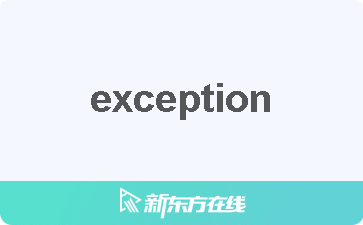exception
[NOUN]

exceptions
1. [C 可数名词] 例外
An exception is a particular thing, person, or situation that is not included in a general statement, judgment, or rule.
双语例句
例:Few guitarists can sing as well as they can play; Eddie, however, is an exception.
很少有吉他手能唱歌唱得和吉他弹得一样好,而艾迪是个例外。
例:The law makes no exceptions.
法律不搞例外。
NOUN. 名词
no exception
1. 不例外 , 无例外
If you make a general statement, and then say that something or someone is no exception, you are emphasizing that they are included in that statement.
双语例句
例:Marketing is applied to everything these days, and books are no exception.
如今市场营销适用于任何事物,图书也不例外。
take exception to something
1. 厌恶 , 反感
If you take exception to something, you feel offended or annoyed by it, usually with the result that you complain about it.
近义词
双语例句
例:He also took exception to having been spied on.
他也厌恶被暗中监视。
with the exception of
1. 除外
You use with the exception of to introduce a thing or person that is not included in a general statement that you are making.
双语例句
例:Yesterday was a day off for everybody, with the exception of Lorenzo.
昨天每个人休一天假,洛伦佐除外。
例:The trees there are older than any other trees in the world, with the exception of the Californian redwoods.
那里的树比世界上的任何其他树都老,加州红杉除外。
without exception
1. 无例外地
You use without exception to emphasize that the statement you are making is true in all cases.
双语例句
例:The vehicles are without exception old, rusty and dented.
这些车辆无一例外地破旧、锈迹斑斑且有撞痕。
PHRASE. 习语

关注新东方在线考雅课程中心
免费获取雅思备考资料包
雅思口语题库
扫码添加助教回复【口语题库】免费领取


 资料下载
资料下载
 公开课
公开课 编辑推荐
编辑推荐